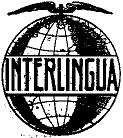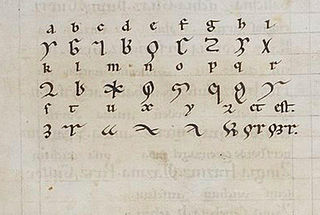Related Research Articles

The Latin cogito, ergo sum, usually translated into English as "I think, therefore I am", is the "first principle" of René Descartes's philosophy. He originally published it in French as je pense, donc je suis in his 1637 Discourse on the Method, so as to reach a wider audience than Latin would have allowed. It later appeared in Latin in his Principles of Philosophy, and a similar phrase also featured prominently in his Meditations on First Philosophy. The dictum is also sometimes referred to as the cogito. As Descartes explained in a margin note, "we cannot doubt of our existence while we doubt." In the posthumously published The Search for Truth by Natural Light, he expressed this insight as dubito, ergo sum, vel, quod idem est, cogito, ergo sum. Antoine Léonard Thomas, in a 1765 essay in honor of Descartes presented it as dubito, ergo cogito, ergo sum.

Latin is a classical language belonging to the Italic branch of the Indo-European languages. Latin was originally a dialect spoken in the lower Tiber area around present-day Rome, but through the power of the Roman Republic it became the dominant language in the Italian region and subsequently throughout the Roman Empire. Even after the fall of Western Rome, Latin remained the common language of international communication, science, scholarship and academia in Europe until well into the 18th century, when other regional vernaculars supplanted it in common academic and political usage, and it eventually became a dead language in the modern linguistic definition.
Pig Latin is a language game or argot in which words in English are altered, usually by adding a fabricated suffix or by moving the onset or initial consonant or consonant cluster of a word to the end of the word and adding a vocalic syllable to create such a suffix. For example, Wikipedia would become Ikipediaway. The objective is to conceal the words from others not familiar with the rules. The reference to Latin is a deliberate misnomer; Pig Latin is simply a form of argot or jargon unrelated to Latin, and the name is used for its English connotations as a strange and foreign-sounding language. It is most often used by young children as a fun way to confuse people unfamiliar with Pig Latin.

Liber AL vel Legis, commonly known as The Book of the Law, is the central sacred text of Thelema. Aleister Crowley said that it was dictated to him by a beyond-human being who called himself 'Aiwass'. Rose Edith Kelly, Crowley's wife, wrote two phrases in the manuscript. The three chapters of the book are spoken by the deities Nuit, Hadit, and Ra-Hoor-Khuit.
Marcus Terentius Varro was a Roman polymath and a prolific author. He is regarded as ancient Rome's greatest scholar, and was described by Petrarch as "the third great light of Rome". He is sometimes called Varro Reatinus to distinguish him from his younger contemporary Varro Atacinus.

Latino sine flexione, Interlingua de Academia pro Interlingua or Peano's Interlingua, is an international auxiliary language compiled by the Academia pro Interlingua under chairmanship of the Italian mathematician Giuseppe Peano (1858–1932) from 1887 until 1914. It is a simplified version of Latin, and retains its vocabulary. Interlingua-IL was published in the journal Revue de Mathématiques in an article of 1903 entitled De Latino Sine Flexione, Lingua Auxiliare Internationale, which explained the reason for its creation. The article argued that other auxiliary languages were unnecessary, since Latin was already established as the world's international language. The article was written in classical Latin, but it gradually dropped its inflections until there were none.
The Punic language, also called Phoenicio-Punic or Carthaginian, is an extinct variety of the Phoenician language, a Canaanite language of the Northwest Semitic branch of the Semitic languages. An offshoot of the Phoenician language of coastal West Asia, it was principally spoken on the Mediterranean coast of Northwest Africa, and the Iberian peninsula and several Mediterranean islands such as Malta, Sicily and Sardinia by the Punic people, or western Phoenicians, throughout classical antiquity, from the 8th century BC to the 6th century AD.

The Spanish language employs a wide range of swear words that vary between Spanish speaking nations and in regions and subcultures of each nation. Idiomatic expressions, particularly profanity, are not always directly translatable into other languages, and so most of the English translations offered in this article are very rough and most likely do not reflect the full meaning of the expression they intend to translate.

A lingua ignota was described by the 12th century abbess of Rupertsberg, St. Hildegard of Bingen, OSB, who apparently used it for mystical purposes. It consists of vocabulary with no known grammar; the only known text is individual words embedded in Latin. To write it, Hildegard used an alphabet of 23 letters denominated litterae ignotae.

VADE RETRO SATANA is a Medieval Western Christian formula for exorcism, recorded in a 1415 manuscript found in the Benedictine Metten Abbey in Bavaria; its origin is traditionally associated with the Benedictines. The initials of this formula have often been engraved around crucifixes or Western Christian Saint Benedict Medals at least since 1780.
Latin obscenity is the profane, indecent, or impolite vocabulary of Latin, and its uses. Words deemed obscene were described as obsc(a)ena, or improba. Documented obscenities occurred rarely in classical Latin literature, limited to certain types of writing such as epigrams, but they are commonly used in the graffiti written on the walls of Pompeii and Herculaneum.

Hans Henning Ørberg was a Danish linguist and teacher. He received a master's degree in English, French, and Latin at the University of Copenhagen and taught these languages in schools in Denmark. He was the author of Lingua Latīna Per Sē Illūstrāta, a widely used method for learning Latin through the natural approach.

Contemporary Latin is the form of the Literary Latin used since the end of the 19th century. Various kinds of contemporary Latin can be distinguished, including the use of New Latin words in taxonomy and in science generally, and the fuller ecclesiastical use in the Catholic Church – but Living or Spoken Latin is the primary subject of this article.

Villard, also known as Villard Books, is a publishing imprint of Random House, one of the largest publishing companies in the world, owned by Bertelsmann since 1998 and grouped in Penguin Random House since 2013. It was founded in 1983. Villard began as an independent imprint of Random House and is currently a sub-imprint of Ballantine Books, itself an imprint of Random House. It was named after a Stanford White brownstone mansion on Madison Avenue that was the home of Random House for twenty years.
Henry Nichols Beard is an American humorist, one of the founders of the magazine National Lampoon and the author of several best-selling books.

Sit tibi terra levis is a Latin inscription used on funerary items from ancient Roman times onwards. The English language translation is approximately "May the earth rest lightly on you" or "May the ground be light to you"; the more literal, word by word, translation, is sit "may be", tibi "to you", terra "ground, soil", levis "light". In common Era It is used as an atheistic form of "Rip", when you do not want to give a religious connotation

Suscipe is the Latin word for 'receive'. While the term was popularized by St. Ignatius of Loyola, founder of the Society of Jesus, who incorporated it into his Spiritual Exercises in the early sixteenth century, it goes back to monastic profession, in reciting Psalm 119. This article focuses rather on its popularization through the Exercises and through the Roman Missal, where it introduces the Canon of the Mass.
Nationality words link to articles with information on the nation's poetry or literature.

Luigi Miraglia is an Italian Latinist and classicist. He is a proponent of Hans Ørberg's natural method of language learning and the founder of the Accademia Vivarium Novum.
References
- Henry Beard, Latin for All Occasions; Villard Books, 1990, ISBN 0-394-58660-3. (Reprinted 2004, Gotham books, ISBN 1-59240-080-9.)
- Henry Beard, Latin for Even More Occasions, 1991, ISBN 0-679-40674-3.